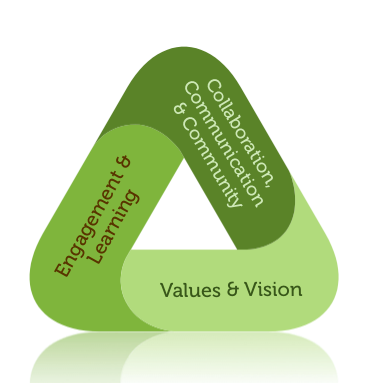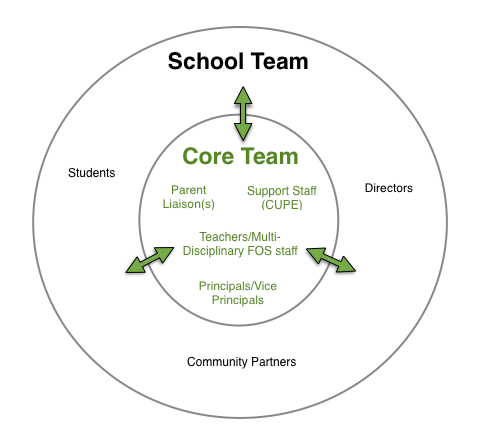
Schools are foundational to creating society and the shared values that bind us together. A great school is often described as a community of learners including students, teachers, support staff, parents, and community members. The intention behind school planning is to engage the community of learners in recognizing the many quality attributes of the school, while highlighting future directions and areas of focus.
Historically, in British Columbia, school planning has taken different forms. Prior to 2002, a school accreditation process that included an external team assessing the work of the school was the primary method to enable school planning. From 2002 to 2015, each school community was asked to develop a school growth plan. Unfortunately, the school growth plan movement was not designed in a collaborative manner. It was solely achievement-oriented and, as such, did not engender commitment from the full community of learners.
Moving forward, the North Vancouver School District has embarked on a process to define and develop a more authentic school planning process that reflects the values of individual communities, while maintaining a commitment to the Mandate for Public Schooling.
School Planning: A New View
| WAS | IS |
|---|---|
| Limited Participants | Multiple Varied Participants |
| Prescriptive | Creative, Adaptive |
| Quantitative data | Multiple and Varied Data Exemplars |
| District Focus | Site Based Focus |
| Product Focus | Process and Product Focus |
| Static | Evolving/Changing |
| Template | No Template |
| Isolation | Family of School Capacity Building |
Design Process
From March 2015 to July 2015, in consultation with representative School Planning Councils and student leaders, a team of educators that included Teachers, Educational Assistants, School Principals, and Directors worked together to define the role, purpose, and direction of the school planning process. The working group developed shared understandings and general processes as the initial foundation to meaningful school planning. Meaningful school planning should enable the development of a ‘vibrant community of learners’ defined by the following “Six Key Attributes”:
- A focus on student engagement and learning
- A culture of teamwork and collaboration
- Respect for adult and student diversity
- A strong sense of community and collective responsibility
- Strong Systemic Structures (e.g., SBRT, Collaboration Time, Staff Meetings)
- Ongoing and relevant communication of student learning.
School Planning Team
The School Planning process is supported by a variety of stakeholders with a focus on enhancing student learning and engagement. The goal of the School Planning team is to understand and participate in a collaborative process of creating a living document that will articulate the unique nature of each school and guide its focus. Developing a thorough understanding of the nature and characteristics of each school is a vital component of the planning process.
Communication Expectations
Members of the School Planning Process are expected to participate with the following communication characteristics:
- to be mindful that all decisions are made for the good of all students
- to suspend judgment, get curious and be respectful
- to ensure all members have opportunities to speak and to be heard
- to accurately represent the larger group when acting as a liaison
Core Team
While many stakeholders may be involved in the Visioning to Goal Setting stage, a Core Team will develop the school plan and monitor its success. The two key responsibilities of the Core Team are to publish the School’s Strategic Planning process and communicate progress. The suggested members of the Core Team are highlighted in green in the chart below. Members are encouraged, but not limited, to participate on the Core Team for a minimum of one school year. The Core Team is responsible for supporting all stakeholders during the process by: establishing goals and strategies, analyzing information, collating data, communicating the plan and progress.
Teacher Selection: Teachers who are interested in being members of the Core Team can indicate their interest to the staff committee who will, in turn, make the membership decision.

This visual is intended as a guideline only. Individual schools can populate their Core Team with any members of the larger group that suit their unique needs.
| Stakeholders | Anticipated Input |
|---|---|
Teachers / Multi-disciplinary FOS staff |
|
Parent Liaison(s) |
|
Support Staff (CUPE) |
|
Principals/Vice-Principals |
|
Directors |
|
Students |
|
Community Partners |
|
Meaningful Consultation
It is essential for School Planning Teams to provide meaningful consultation and communication throughout the school planning process.
Meaningful consultation is a process, which anchors decision-making in education. When decisions are being made for students, all stakeholders need to be given the opportunity to share their unique perspective. School teams need to consider how they will provide a respectful environment for this group to share their perspective.
You can expect that groups may have different opinions and perspectives. Consultation is a process whereby groups try to align their views more closely through discussion and sharing of realities from differing perspectives.
More information on meaningful consultation.
School Planning Timeline (January to June 2016):
The following timeline was intended to provide a linear perspective to help orient you to the stages of the school planning process from January to June 2016. Included are suggested activities to augment those that are designed by your School Planning Team (SPT). These suggested activities are not restricted to a specific timeline objective and can be freely moved to support other stages of the process.
| Date | Objective | Possible Activities |
|---|---|---|
| January 2016 | Establish School Planning Steering Teams.
Share SP PowerPoint with staff and provide the opportunity for feedback. Provide an update to PAC and school community about the new school planning process. Garner feedback from PAC as to what Meaningful Consultation looks like. Plan idea(s) for meaningful parent consultation. |
|
| March 2016 | Develop and post the planning process to be undertaken. |
|
| June 2016 | Plan activities and gather input in identifying priorities |
|
Discussion Papers


